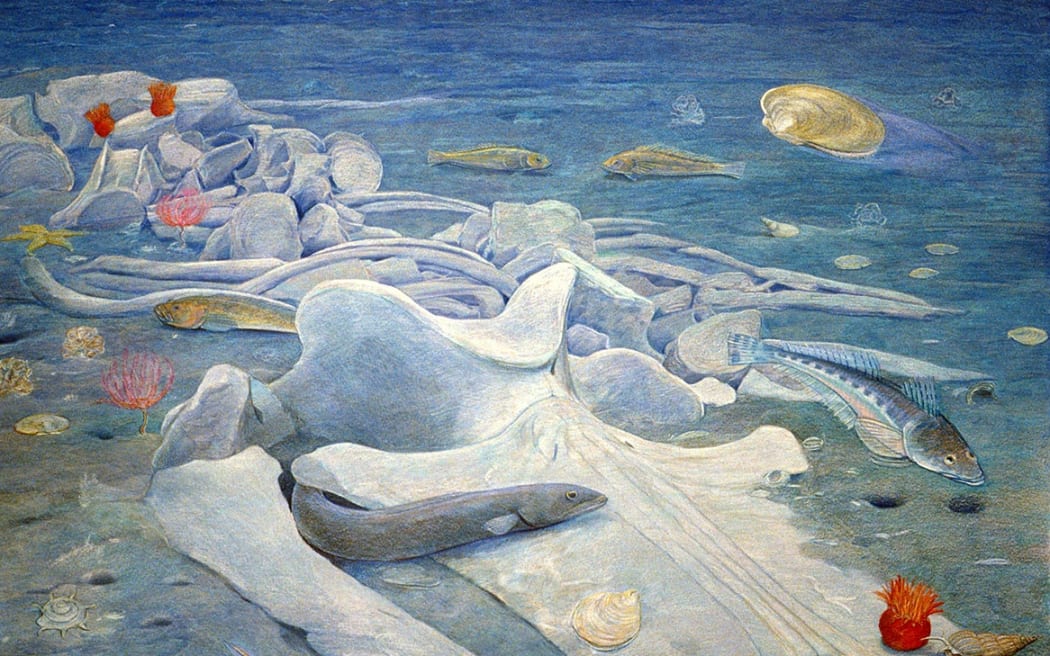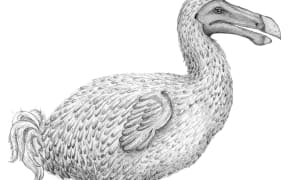
Burial in the ancient sea of Zealandia: A Toipahautea whale skeleton is slowly covered by sand 27-28 million years ago, on its path to become a fossil. Photo: Reconstruction by Chris Gaskin, ©Geology Museum, University of Otago
Authorities are investigating the removal of a locally treasured whale fossil, estimated to be 23 million years old, from the mouth of the Little Wanganui River, near Karamea.
On Sunday, some Little Wanganui residents confronted a man and two women using a rocksaw and chisel to cut out the fossil from the riverbank.
The trio alleged to onlookers they had permission, and then made off with the large piece of rock-like material in a boat.
"No one owned it. It was never damaged or vandalised... Every single person who has grown up in the area treated it with respect... There was no legitimate reason (to remove it) apart from personal gain," Little Wanganui local Tane Franken told Stuff.
Department of Conservation acting Buller area manager Jacob Fleming said the department heard of the alleged theft via its hotline on Sunday afternoon.
It contacted the regional council, given its jurisdiction over the coastal zone, however DOC was assisting that inquiry, Fleming said today.
Regional council planning and science manager Rachel Vaughan said they were now investigating to see if it was a breach of council rules.
A compliance officer was already in Karamea.
Access to the fossil site required a boat, which was difficult, and the inquiry was continuing.
"At this stage there were no consents granted to take a fossil [from the area]," Vaughan said.
West Coast police prevention manager senior sergeant Mark Kirkwood said police were part of a joint investigation.
"Police are aware the fossil has been removed and are working with council in investigating the incident."
Vaughan said the regional council had jurisdiction because the river mouth site was between the high and low tide marks. Rules under the West Coast Regional Plan would also apply.
A person walking along a beach "picking up stones" was allowed, but the "mechanical" removal of beach material required resource consent. Whether that technically applied in this case was as yet uncertain.
"Other agencies are investigating as well. We'll gather as much information as we can before we make a decision."
Prosecution a possibility
Depending on the outcome, the council had powers under the Resource Management Act to prosecute the illegal removal of beach material.
"If we find that there has been a breach of our regional plan then we will look at what is available to us."
The site sits at the northern end of the Gentle Annie to Little Wanganui Outstanding Coastal Natural area in the draft Te Tai o Poutini Plan. The area also backs on to the Karamea Ecological Area.
The new plan's schedule for outstanding natural features lists several outstanding fossil sites, including the Honeycomb Hill Holocene cave system at Oparara - but the Little Wanganui fossil site is not identified.
West Coast Gem and Mineral Club president Mary Trayes said the existence of exposed fossilised remains along the West Coast, out of mudstone or similar, on the foreshore was fairly common.
However, sometimes locals valued fossilised whale bones in their area and would be outraged at collectors going "to the trouble of sawing it out".
Trayes said rock clubs were sensitive about removing such artefacts.
"We've got an approach that we take what we need for our collection - we don't take everything, and we're very mindful being in the public sector about what people take."
But there was "a market" for fossils, driving their removal along with gains from other illegal mineral activities, which was "a grey area".
"It's to do with people commercialising the landscape for their own purposes."
The Greymouth Star has approached a local man allegedly connected to the removal for comment.
Local Democracy Reporting is Public Interest Journalism funded through NZ On Air







